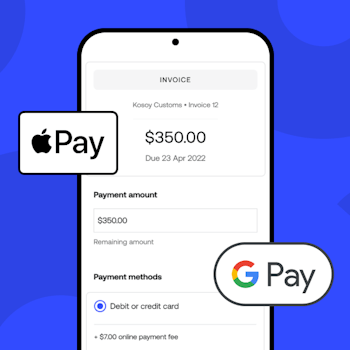
Wait… what? How to handle inappropriate comments from a client, partner, coworker or friend
Wait . . . What?
Someone you do business with just said something completely out of line.
You can tell they think they’re being lighthearted and funny but, no thank you. What they said has left you feeling awkward and uncomfortable.
You pause and replay in your mind what just happened. There’s no mistake; it was an inappropriate comment. Maybe it was homophobic, sexist, or racist — whatever it was, it should never have been said.
So, what do you do?
Do you call them out directly?
What if you have anxieties about it? What if this relationship is important to your career and goals?
Should you say anything at all if you’re worried about retaliation? What about the harm to your professional reputation? What if it’s someone you care about?
At Invoice2go, a Bill.com company, we believe tolerance and inclusivity are more crucial than ever. Respect, comfort, and empowerment are essential elements of success.
Within our own company, strive to support self-employed professionals and small business owners, regardless of race, gender, or background.
When it comes to our subscribers and community members, we try our best to provide the tools and resources you need to feel comfortable and confident, too.
It’s possible to handle awkward, frustrating, or painful professional situations with authority and grace. And whether you’re communicating with a partner or a colleague, communication is essential to successful relationships.
There’s evidence that women and people of color are more likely to get pushback after expressing assertiveness in professional situations. We want to ensure that all professionals have strategies in place to manage the difficult moments in their careers.
While confrontation and addressing inappropriate comments can be anxiety-inducing, navigating professional interpersonal conflict in a way that makes you feel proud will lead you to greater confidence, self-respect – and success.
Here are 5 empowering tips to help you handle inappropriate remarks like a boss:
1. Validate your feelings about inappropriate comments
First, if an offensive comment just made you pause, you don’t need to question your feelings. Anger, confusion, or frustration are justified, even if the other person didn’t intend to say something offensive or hurtful.
In fact, many inappropriate comments don’t involve slurs or vulgar language. Everyone has some bias, and everyday bigotry is unfortunately common. For example, telling a woman to smile more or that she’s too emotional plays to misogynistic tropes that have been used to limit women’s power for ages. Casual jokes about someone’s last name or stereotypes about their family roots often tie to darker racist ideas.
While some argue this is just language, evidence that comments of this nature feed into deeper prejudice. If they inspire a strong reaction in you, it’s understandable.
When you hear this type of language, you may want to immediately respond in various ways. However, no matter what you do – if possible – take a brief moment to breathe and understand what exactly about the comment upset you. The Harvard Business Review suggests that you take a little time – even if it’s just a second or two.
2. Decide if and how you’d like to respond
How you respond is up to you. Every situation is different. How you react depends on who you are and the relationship you have with the other person. However, keep this in mind: No matter how wrong or poor the other’s behavior, you want to feel pride in your words and actions.
The Anti-Defamation League recommends that you consider what you know about this person and if there could be significant costs discussing their comments directly.
Speaking up has many benefits. It can help you eliminate everyday racism, misogyny, or other bigotry from your work environment. It also clearly states your boundaries and opens the door to a meaningful discussion – and potentially a stronger working relationship.
If you’re in a position of power, you need to take action. For example, if you’re a small business owner with employees, they need to feel comfortable on the job. Failing to protect them could even lead to legal trouble.
However, there are plenty of situations where you may not want to address this person directly or at all. Suppose you believe it could create a hostile environment or that this person could retaliate against you. In that case, you may want to be less direct.
No matter what you do, there are two essential principles to keep in mind:
- Even if there may be significant consequences, that doesn’t mean you should avoid difficult conversations or back off. If you feel something was over the line, take action. In the next section, we’ll give you scripts and tactics to help.
- You’re also not solely responsible for correcting the poor behavior of others. There may be cases where you don’t want to say or do anything. Sometimes it could be best just to walk away. For instance, if you’re a consultant and a non-so-great client says something egregious, you have the power to end that relationship.
3. Speak up if it feels appropriate to do so
If speaking up feels like the right action, here are some tips to help you be more effective in your communication:
Explain rather than accuse
You may be tempted to immediately respond to an inappropriate comment with a blunt accusation like, “You’re sexist!” In some cases, that could be appropriate.
However, accusatory statements tend to bring out defensive reactions. When people bring up their defenses, they’re less likely to listen to you or change their minds. Unless it’s obvious, don’t assume the person knows they’re being offensive – they could be clueless.
Express the comment’s impact on you
Try using “I” statements to maximize the impact of your message. This could be a gateway for a more meaningful discussion. You could say something like, “You probably didn’t mean it that way, but I felt uncomfortable by your comment” or “I’m really hurt by what you just said.”
It may not feel as immediately satisfying as calling someone out. Still, research shows that this type of communication is more likely to have a lasting impact on others’ behavior. When you express the negative impact someone has on you, they’re more likely to change.
Ask questions
Asking the person to repeat themselves can also be highly useful to subtly direct attention to inappropriate comments. Repeating something more consciously can cause them to realize that they were out of line.
Other non-accusatory questions could be something like, “What did you mean by that?” If a person doesn’t understand why something they said was offensive, it’s OK to give more details into why. While you may be angry, avoid being passive-aggressive – the more genuine you are, the more likely you’ll be heard.
If you’re open to it, you can also ask the person to expand on their reasoning. This allows you to look more deeply at any biases and clear up misunderstandings. While it may be challenging to make space for someone who has upset you, you may be able to have a meaningful discussion.
Call it out
If you’ve decided that something is completely over the line, you can say something like, “That comment was clearly racist.”
This may cause someone to get defensive or hostile. Nevertheless, it can also cause this person to apologize and reflect on their biases. If the person reacts poorly, you’ve gained information about who they are. However, if they’re in a position of authority and you need to continue working with them, make sure to protect yourself.
4. Take decisive action to handle the situation when needed
Direct discussion isn’t the only action you can take. There are plenty of other ways to gracefully and authoritatively handle situations like these.
Ignore, change the subject, or walk away
You can ignore their comment or change the subject. While not everyone will get the message, people who have greater emotional intelligence may pick up that they said something out of line.
You can also choose to remove yourself from the room or discussion. As self-employed professionals, you may have flexibility in who you work with and when. If applicable, you can end that relationship or place that person at a greater distance.
Take action with an authority if possible
If you currently work for an employer, consider escalating the issue – especially if this happens repeatedly. Consider talking to colleagues and collectively make a case to management that your work environment has become hostile.
If you’ve tried to deal with inappropriate behavior directly and it hasn’t stopped, consider a private discussion with someone more senior.
If you’re in a position of leadership
It’s time to make changes. Brainstorm what actions you can take. If you’ve talked to this person and they’ve not changed their behavior, do you need to continue working with them? Can you find other clients or colleagues? For your own mental health and prosperity, make it a point to prioritize a healthy and safe work environment.
The Bottom Line
Handling inappropriate comments with colleagues, clients, and others you do business with can be awkward and uncomfortable. However, taking appropriate action based on the situation can help you create an ideal work environment and lead to greater confidence.
How have you handled inappropriate comments in your professional life? Join the discussion in Female Founders.
Related Articles

How to accept credit card payments on Invoice2go in 3 simple steps

Accept payments online via Apple Pay and Google Pay

Must-not-miss write-offs as you wrap up 2022 year-end finances

5 ways accepting credit and debit card payments helps your business stay resilient

4 easy ways to increase cash flow today

What is Small Business Saturday and why is it important?
The features and surprising benefits of a well-designed packing slip
